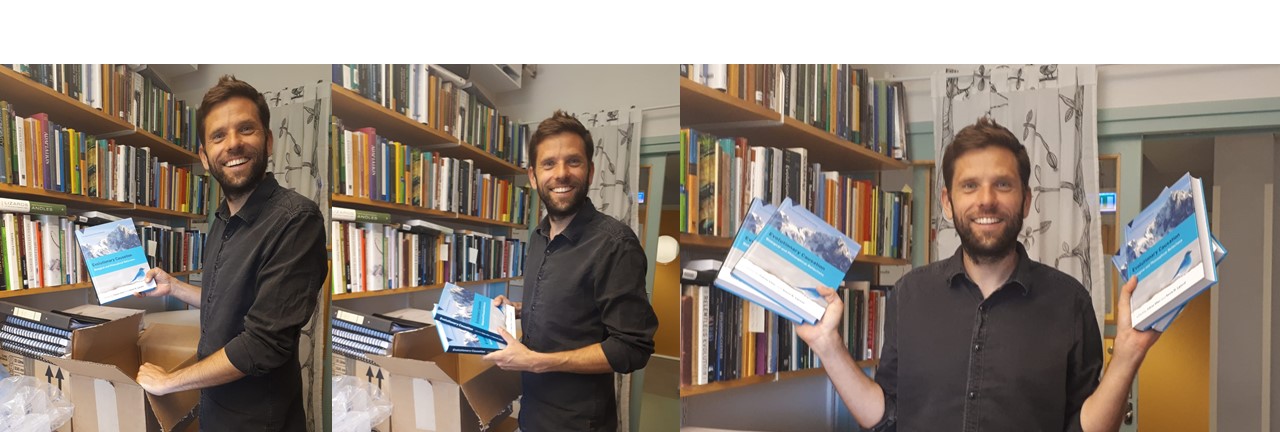Evolutionary Causation: Biological and Philosophical Reflections
18 September 2019
“Evolutionary Causation: Biological and Philosophical Reflections“, edited by Tobias Uller and Kevin Laland, has just been released through the MIT Press. One of the major publications from the EES project, it is a tightly-integrated array of essays from biologists and philosophers on the causal structure of evolution. You can read the preview on Google Books and order the book through major outlets such as Amazon, Powell’s, etc.
In the next few blog posts, we will explore some of the major themes presented in the book, such as developmental bias & plasticity, niche construction, major transitions in individuality, etc. Today, we interviewed Tobias Uller, lead co-editor, about the book and its backstory. We also asked him to suggest various ways to approach the book.

Tobias unboxing the book
Lynn Chiu: What is this collection about, why the title “evolutionary causation”?
Tobias Uller: The book is about how to think about the causes of evolution. This is important because to explain something is often to give an account of its causes. So we had better have a decent grasp of what we mean when we say that X is a cause of Y, or what makes some features causes and other features constraints. If we don’t, the risk is that we don’t manage to deliver the explanations we want, or that we end up in fruitless debates.
In evolutionary biology, fitness differences is commonly considered to be necessary and sufficient to explain adaptation, whereas the processes that generate variation – development – only explains the absence of adaptation. That seems to suggest there is something special about the causes of fitness differences, or natural selection. Alternatively, this apparent asymmetry in causal power may be a result of the way we represent evolution, and not something that is inherent to the fabric of evolution. After all, the classic distinction between proximate and ultimate causes that was popularized by Ernst Mayr is based on an idealization of biological evolution and not the full gory details. Perhaps it is not always the appropriate idealization? To complicate things further, some people think that natural selection does not really qualify as a cause at all. If this is true, the perhaps some of our evolutionary explanations are not even causal.
Some of this may sound awfully philosophical, but we should rather consider it theoretical biology. Understanding what counts as causes is really important to scientists since we routinely look for those causes and argue about their importance and explanatory power. Both biologists and philosophers of science have important insights to contribute here, so they are both given ample space. One thing that makes the book special is that the chapters are really highly accessible for both camps.
Lynn Chiu: Can you tell us a bit about the book’s backstory? How did philosophers and biologists come together under this project?
Tobias Uller: The chapters are based on presentations at a meeting1 at the KLI in Austria. The KLI is an institute for theoretical biology and it is a wonderful place for meetings like these. Kevin Laland and I organized it as part of an international research program on evolutionary biology. Twenty projects in this program are theoretical or empirical rather than philosophical, but they were put together with the belief that we have much to gain from working closely with philosophers of biology. That is why there are also projects focused on historical and philosophical foundations. I think this aspect of the project has made an enormous difference. It has made a difference to the individual projects and it has played an important role in moving forward various controversies in evolutionary biology, in particular those that revolve around the causal and explanatory role of development, extra-genetic inheritance and niche construction. This book is one contribution towards that goal.
Lynn Chiu: Can you suggest several ways we, as readers, can read through this book?
I recommend beginning with the Introduction since this gives context and briefly summarizes what is in the other chapters. The book is organized in a way that should make it rewarding to read the chapters in order. We have chapters that deal with population genetics, evo-devo and more ecological oriented perspectives. Many chapters are concerned one way or another with how evolutionary biologists handle the fact that what they wish to explain is enormously complex and has a history. Sometimes the evolutionary process itself is evolving, so there are also chapters on evolutionary transitions in individuality. We also have chapters on the relationship between causation and information in biology and fundamental problems in philosophy of science, such as the methodology of research programs. But each chapter is stand-alone so which one you would want to read next depends on who you are!
Lynn Chiu: Thank you, Tobias, for the overview! I look forward to further exploring the ways we can group various chapters under different EES related themes.
The MIT Press publication page: https://mitpress.mit.edu/books/evolutionary-causation
1. Information about the 1st EES workshop on cause and process in evolution
Twitter hashtag: #CAPIE2017
Blog posts on the 1st workshop by Wim Hordijk, Jan Baedke, and Massimo Pigliucci
KLI event webpage and photo gallery